[c=darkgreen]These are all countries with largeareas of low population density. Except for Libya, Oman and Iceland, these are among the poorest countries in the world. Low population density or poverty, or both, are the main reasons for non-existent railway system.
.
.
10. Bhutan

21 percent of the Bhutanese ruralhouseholds have to walk from one to four hours to the nearest all-season road, and another 21 percent have to spend more thanhalf a day.
Area:38.394 sq km (14,824 sq mi)
Population:708 427 inhabitants
Until 1961, because of the lack of paved roads, travel in Bhutan was by foot or on muleback or horseback. The 205-kilometer (130 mi) trek from the Indian border to Thimphu took six days.Today, transport in Bhutan comprises approximately 8,000 kilometres (5,000 mi) of roads and two airports, but no railroad.In 2005 the King of Bhutan and Indian Prime Minister agreed to carry out a feasibility study for rail links. In 2009, the new King of Bhutan finalised a plan to build a 11-mile (18 km) Indian gauge rail link funded by India.
.
09. Iceland

Min�0‹3r-the museum exhibit.
Area:103.001 sq km (39,770 sq mi)
Population: 318 452 inhabitants
Iceland has no public railways, although proposals to build a passenger line between Keflav¨ªk and Reykjav¨ªk have been made as well as proposals to build a light rail system in Reykjav¨ªk. Several former locomotive-powered and hand-operated railways have closed and been dismantled, although some evidence of their existence remains in museums and as static exhibits.
.
08. Oman
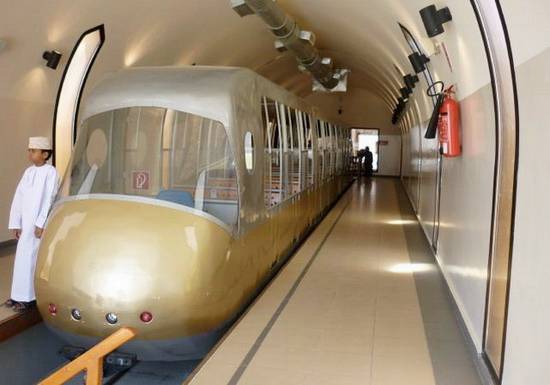
Al Hoota Caves train.
Area:309.501 sq km (119,498sq mi)
Population: 2 773 479 inhabitants
There are no main line railways in Oman, but some are planned, including links to adjacent countries. Although there is no railway system and the public railway lines, Oman has a small tourist train. The narrow gauge Al Hoota Cave Train takes touristsinto the cave complex in a journey of 4 minutes and distance of 400m (1,300 ft).
.
07. Papua New Guinea
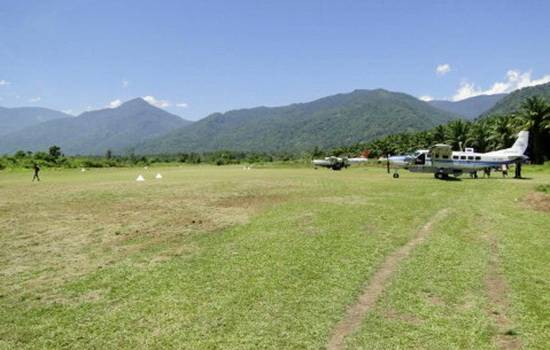
Rural airstrip in Papua New Guinea.
Area:462.840 sq km (178,703 sq mi)
Population:6 187 591 inhabitants
Transport in Papua New Guinea is in many cases heavily limited by the mountainous terrain. The capital, Port Moresby, is not linked by road to any of the othermajor towns and many highland villages can only be reached by light aircraft or on foot. Papua New Guinea has no major railways, but some mine sites have disused tracks. During the period of German colonial control at the start of the 20th century numerous plantation railways had been constructed inGerman New Guinea. These werebuilt near the settlements of Madang and Rabaul. After the fall of German New Guinea to the Australians in the First World Warthe railways ran into disrepair.
.
06. Yemen

Road into village of Hababah, Yemen.
Area:527.970 sq km(203,796sq mi)
Population: 25 130 000 inhabitants
As a direct consequence of the countrys poverty, Yemen compares unfavorably with its Middle Eastern neighbors in terms of transportation infrastructure and communications network. Roads are generally poor, although several projects are planned to upgrade the system. There are no railways in Yemen, though there have been a number of plans and proposals. More recently, in 2005, the Yemeni government began to investigate the possibility of constructing rail connections as part of a larger upgrade to transportation infrastructure.
.
05. Central African Republic

Road in the Central African Republic. Roads in the Central African Republic are quiet. Almost no one has a car and there are far fewer motorbikes here than other African countries.
Area:622.984 sq km (240,534sq mi)
Population:4 422 000 inhabitants
There are no railways in the Central African Republic. Railway line from Cameroon port of Kribito Bangui, capital of Central African Republic, was proposed in 2002.
.
04. Somalia
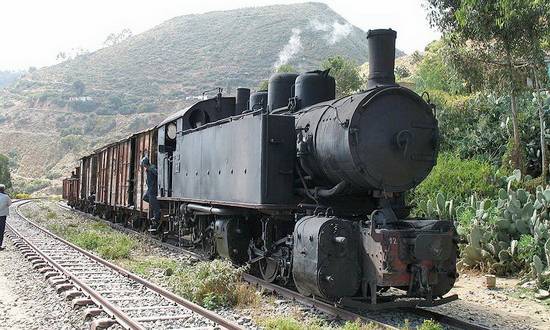
Ansaldo 442- steam locomotive,built in 1938 and similar to thoseused in the Somali railway.
Area: 637.657 sq km (246,200sq mi)
Population: 9 925 640 inhabitants
The only railway in Somalia, the Mogadishu-Villabruzzi Railway, was built by Italy in the 1910s. The Mogadiscio-Villabruzzi Railway was the railway of ItalianSomaliland, and connected the capital of Somalia with the Shebelle river agricultural areas from 1914 to 1941. The railway was dismantled in the 1940s by the British, and never restored.
.
03. Niger
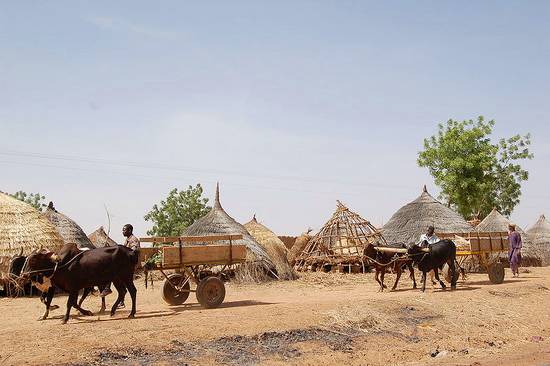
Horsecarts are a common sight on Nigers roads, like these near Diffa in eastern Niger.
Area:1.267.000 sq km (489,678 sq mi)
Population: 15 730 754 inhabitants
There are no railways in Niger, although Niger is a user of the Benin and Togo railway lines which carry goods from seaportsto the Niger border. Rail lines to Niamey and other points in Nigerwere proposed during the colonial period, and continue to be discussed.
.
02. Chad

One of the transport modes in Chad.
Area:1.284.000 sq km (495,753 sq mi)
Population: 10 329 208 inhabitants
Transport infrastructure within Chad is generally poor, especiallyin the north and east of the country. River transport is limited to the south-west corner.Up to 2012 Chad had no rail system. Two lines are planned to Sudan and Cameroon from the capital with construction expected to start in 2012 and be complete in 4 years.
.
01. Libya
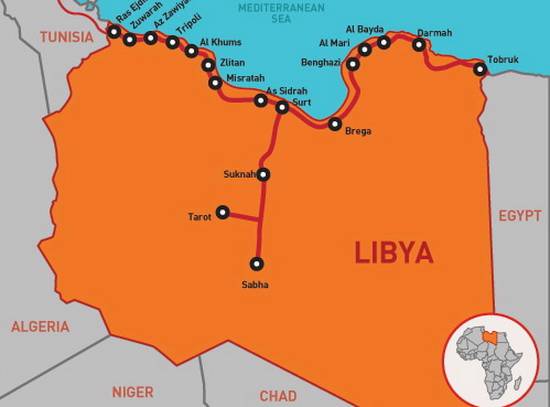
Future National Rail Network of Libya.
Area:1.759.541 sq km (679,359 sq mi)
Population: 5 670 688 inhabitants
There have been no operational railways in Libya since 1965, but various lines existed in the past. Plans for a new network have been under development for some time, and in 2008 and 2009various contracts were placed and construction work started ona 1,435 mm (4 ft 8 1/2 in) standard gauge railway parallel to the coast from the Tunisian border at Ras Ajdir to Tripoli, andon to Misrata, Sirte, Benghazi andBayda. But, construction of a national rail system was suspended because of the 2011 Libyan civil war.[/c]
.
.
10. Bhutan

21 percent of the Bhutanese ruralhouseholds have to walk from one to four hours to the nearest all-season road, and another 21 percent have to spend more thanhalf a day.
Area:38.394 sq km (14,824 sq mi)
Population:708 427 inhabitants
Until 1961, because of the lack of paved roads, travel in Bhutan was by foot or on muleback or horseback. The 205-kilometer (130 mi) trek from the Indian border to Thimphu took six days.Today, transport in Bhutan comprises approximately 8,000 kilometres (5,000 mi) of roads and two airports, but no railroad.In 2005 the King of Bhutan and Indian Prime Minister agreed to carry out a feasibility study for rail links. In 2009, the new King of Bhutan finalised a plan to build a 11-mile (18 km) Indian gauge rail link funded by India.
.
09. Iceland

Min�0‹3r-the museum exhibit.
Area:103.001 sq km (39,770 sq mi)
Population: 318 452 inhabitants
Iceland has no public railways, although proposals to build a passenger line between Keflav¨ªk and Reykjav¨ªk have been made as well as proposals to build a light rail system in Reykjav¨ªk. Several former locomotive-powered and hand-operated railways have closed and been dismantled, although some evidence of their existence remains in museums and as static exhibits.
.
08. Oman

Al Hoota Caves train.
Area:309.501 sq km (119,498sq mi)
Population: 2 773 479 inhabitants
There are no main line railways in Oman, but some are planned, including links to adjacent countries. Although there is no railway system and the public railway lines, Oman has a small tourist train. The narrow gauge Al Hoota Cave Train takes touristsinto the cave complex in a journey of 4 minutes and distance of 400m (1,300 ft).
.
07. Papua New Guinea

Rural airstrip in Papua New Guinea.
Area:462.840 sq km (178,703 sq mi)
Population:6 187 591 inhabitants
Transport in Papua New Guinea is in many cases heavily limited by the mountainous terrain. The capital, Port Moresby, is not linked by road to any of the othermajor towns and many highland villages can only be reached by light aircraft or on foot. Papua New Guinea has no major railways, but some mine sites have disused tracks. During the period of German colonial control at the start of the 20th century numerous plantation railways had been constructed inGerman New Guinea. These werebuilt near the settlements of Madang and Rabaul. After the fall of German New Guinea to the Australians in the First World Warthe railways ran into disrepair.
.
06. Yemen

Road into village of Hababah, Yemen.
Area:527.970 sq km(203,796sq mi)
Population: 25 130 000 inhabitants
As a direct consequence of the countrys poverty, Yemen compares unfavorably with its Middle Eastern neighbors in terms of transportation infrastructure and communications network. Roads are generally poor, although several projects are planned to upgrade the system. There are no railways in Yemen, though there have been a number of plans and proposals. More recently, in 2005, the Yemeni government began to investigate the possibility of constructing rail connections as part of a larger upgrade to transportation infrastructure.
.
05. Central African Republic

Road in the Central African Republic. Roads in the Central African Republic are quiet. Almost no one has a car and there are far fewer motorbikes here than other African countries.
Area:622.984 sq km (240,534sq mi)
Population:4 422 000 inhabitants
There are no railways in the Central African Republic. Railway line from Cameroon port of Kribito Bangui, capital of Central African Republic, was proposed in 2002.
.
04. Somalia

Ansaldo 442- steam locomotive,built in 1938 and similar to thoseused in the Somali railway.
Area: 637.657 sq km (246,200sq mi)
Population: 9 925 640 inhabitants
The only railway in Somalia, the Mogadishu-Villabruzzi Railway, was built by Italy in the 1910s. The Mogadiscio-Villabruzzi Railway was the railway of ItalianSomaliland, and connected the capital of Somalia with the Shebelle river agricultural areas from 1914 to 1941. The railway was dismantled in the 1940s by the British, and never restored.
.
03. Niger

Horsecarts are a common sight on Nigers roads, like these near Diffa in eastern Niger.
Area:1.267.000 sq km (489,678 sq mi)
Population: 15 730 754 inhabitants
There are no railways in Niger, although Niger is a user of the Benin and Togo railway lines which carry goods from seaportsto the Niger border. Rail lines to Niamey and other points in Nigerwere proposed during the colonial period, and continue to be discussed.
.
02. Chad

One of the transport modes in Chad.
Area:1.284.000 sq km (495,753 sq mi)
Population: 10 329 208 inhabitants
Transport infrastructure within Chad is generally poor, especiallyin the north and east of the country. River transport is limited to the south-west corner.Up to 2012 Chad had no rail system. Two lines are planned to Sudan and Cameroon from the capital with construction expected to start in 2012 and be complete in 4 years.
.
01. Libya

Future National Rail Network of Libya.
Area:1.759.541 sq km (679,359 sq mi)
Population: 5 670 688 inhabitants
There have been no operational railways in Libya since 1965, but various lines existed in the past. Plans for a new network have been under development for some time, and in 2008 and 2009various contracts were placed and construction work started ona 1,435 mm (4 ft 8 1/2 in) standard gauge railway parallel to the coast from the Tunisian border at Ras Ajdir to Tripoli, andon to Misrata, Sirte, Benghazi andBayda. But, construction of a national rail system was suspended because of the 2011 Libyan civil war.[/c]



